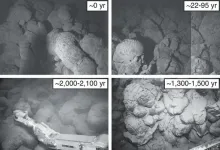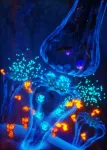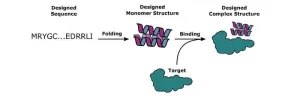(Press-News.org) An international team of scientists have discovered an unusual Jupiter-sized planet orbiting a low-mass star called TOI-4860, located in the Corvus constellation.
The newly discovered gas giant, named TOI-4860 b, is an unusual planet for two reasons: stars of such low mass are not expected to host planets like Jupiter, and the planet appears to be particularly enriched by heavy elements.
The study, led by University of Birmingham astronomers, is published today (Friday 4th August) in a letter published within the Monthly Notices of the Royal Astronomical Society.
The planet was initially identified using NASA’s Transiting Exoplanet Survey Satellite as a drop of brightness while transiting in front of its host star, but that data alone was insufficient to confirm that it was a planet.
The team used the SPECULOOS South Observatory, located in the Atacama Desert in Chile, to measure the planetary signal in several wavelengths and validated the planetary nature. The astronomers also observed the planet just before and after it disappeared behind its host star, noticing that there was no change in light, meaning the planet was not emitting any. Finally, the team collaborated with a Japanese group using the Subaru Telescope in Hawai’i. Together they measured the mass of the planet to fully confirm it.
Following this star and confirming its planet was the initiative of a group of PhD students within the SPECULOOS project.
George Dransfield, one of those PhD students, who recently submitted her thesis at the University of Birmingham, explains: “Under the canonical planet formation model, the less mass a star has, the less massive is the disc of material around that star.
“Since planets are created from that disc, high-mass planets like Jupiter, were widely expected not to form. However, we were curious about this and wanted to check planetary candidates to see if it was possible. TOI-4860 is our first confirmation and also the lowest mass star hosting such a high mass planet.”
Amaury Triaud, Professor of Exoplanetology at the University of Birmingham, who led the study said: “I am ever thankful to the bright PhD students of our team for proposing to observe systems like TOI-4860. Their work has really paid off since planets like TOI-4860 are vital to deepening our understanding of planet formation.
“A hint of what might have happened is hidden in the planetary properties, which appear particularly enriched in heavy elements. We have detected something similar in the host star too, so it is likely that an abundance of heavy elements catalysed the planet formation process.”
The new gas giant takes about 1.52 days to complete a full orbit around its host star, but because its host is a cold low mass star, the planet itself can be referred to as a ‘Warm Jupiter’. This is a subclass of planet that holds particular interest for astronomers looking to build on their initial observations and learn more about how these kinds of planets are formed.
Mathilde Timmermans, another student of the SPECULOOS project, working at the University of Liege in Belgium concludes: “Thanks to its very short orbital period, and to the properties of its host star, the discovery of TOI-4860 b provides a brilliant opportunity to study the atmospheric properties of a warm Jupiter and learn more about how gas giants are formed.”
Recently the team has been awarded telescope time at the Very Large Telescope, in Chile, which they intend to use to confirm several more planets with similar properties.
END
New exoplanet discovery builds better understanding of planet formation
2023-08-04
ELSE PRESS RELEASES FROM THIS DATE:
Novel machine learning blood test detects cancers with genome-wide mutations in single molecules of cell-free DNA
2023-08-04
Novel blood testing technology being developed by researchers at the Johns Hopkins Kimmel Cancer Center that combines genome-wide sequencing of single molecules of DNA shed from tumors and machine learning may allow earlier detection of lung and other cancers.
The test, called GEMINI (Genome-wide Mutational Incidence for Non-Invasive detection of cancer), looks for changes to DNA throughout the genome. First, a blood sample is collected from a person at risk for developing cancer. Then, cell-free DNA (cfDNA) shed by tumors is extracted from the plasma and sequenced using cost-efficient ...
Research reveals Hawai‘i’s undersea volcano, Kama‘ehu, erupted five times in past 150 years
2023-08-04
Kamaʻehuakanaloa (formerly Lōʻihi Seamount), a submarine Hawaiian volcano located about 20 miles off the south coast of the Big Island of Hawai‘i, has erupted at least five times in the last 150 years, according to new research led by Earth scientists at the University of Hawai‘i at Mānoa. For the first time, scientists were able to estimate the ages of the most recent eruptions of Kamaʻehu, as well as the ages of eight additional older eruptions at this volcano going back about 2,000 years. Their findings were published recently in Geology.
Hawaiian volcanoes are thought to transition through a series of growth stages. ...
Insulin-like hormones critical for brain plasticity
2023-08-04
Research from the Max Planck Florida Institute for Neuroscience has identified a mechanism through which insulin-like growth factors facilitate brain plasticity.
The insulin superfamily of hormones, including insulin, insulin-like growth factor 1 (IGF1), and insulin-like growth factor 2 (IGF2), play a crucial role not only in regulating blood sugar, metabolism, and growth, but also in healthy brain development and function, including learning and memory. These hormones can enter the brain through the bloodstream from the liver or can be synthesized directly in neurons and glial cells within the brain. They bind to receptors, ...
A mother’s diet can protect her grandchildren’s brains: genetic model study
2023-08-04
Mothers who eat apples and herbs in early pregnancy could be protecting the brain health of their children and grandchildren, a Monash University study using genetic models has found.
The discovery is part of a project that found a mother’s diet can affect not just her child’s brain but also those of her grandchildren.
Published in Nature Cell Biology, the Monash Biomedicine Discovery Institute study found that certain foods could help protect against the deterioration of brain function.
More specifically, the study used roundworms (Caenorhabditis elegans) as the genetic model because many of ...
Study examines Earth and Mars to determine how climate change affects the paths of rivers
2023-08-04
In a new study published in Nature Geosciences, researchers, led by a Tulane University sedimentologist , investigated why the paths of meandering rivers change over time and how they could be affected by climate change.
Chenliang Wu, PhD, a postdoctoral researcher at Tulane University School of Science and Engineering, began this research by looking at the Mississippi River before adding other rivers on Earth and ancient riverbeds on Mars to the study.
The study specifically looks at river sinuosity, or how much rivers curve. The sinuosity of rivers changes over time, depending on the age of the river and environmental changes. Some of these changes ...
MSU scientists help discover the highest-energy light coming from the sun
2023-08-03
EAST LANSING, Mich. – Sometimes, the best place to hide a secret is in broad daylight. Just ask the sun.
“The sun is more surprising than we knew,” said Mehr Un Nisa, a postdoctoral research associate at Michigan State University. “We thought we had this star figured out, but that’s not the case.”
Nisa, who will soon be joining MSU’s faculty, is the corresponding author of a new paper in the journal Physical Review Letters that details the discovery of the highest-energy ...
Outdoor air pollution may increase non-lung cancer risk in older adults
2023-08-03
Key points:
A cohort study of millions of Medicare beneficiaries found that chronic exposures to PM2.5 and NO2 over a 10-year period increased the risk of developing colorectal and prostate cancers.
Even in areas with low pollution levels, researchers found substantial associations between exposures to these pollutants and the risk of developing colorectal and prostate cancers, in addition to breast and endometrial cancers.
For immediate release: August 3, 2023
Boston, MA—Chronic exposure to fine particulate air pollutants (PM2.5) ...
University of Minnesota-led study links long-term artificial sweetener intake to increased body fat adipose tissue volume
2023-08-03
MINNEAPOLIS/ST. PAUL (08/03/2023) — Published in the International Journal of Obesity, University of Minnesota Medical School and School of Public Health researchers led a study on the relationship between dietary intake and cardiovascular disease risk factors.
Over 20 years, the research team examined people's regular dietary intake, paying particular attention to non-nutritive sweeteners commonly found in artificial sweeteners. They found that long-term consumption of aspartame, saccharin and diet beverages were linked to increased fat stores in the abdomen and fat within muscle. However, ...
Deep learning for new protein design
2023-08-03
The key to understanding proteins — such as those that govern cancer, COVID-19, and other diseases — is quite simple. Identify their chemical structure and find which other proteins can bind to them. But there’s a catch.
“The search space for proteins is enormous,” said Brian Coventry, a research scientist with the Institute for Protein Design, University of Washington and The Howard Hughes Medical Institute.
A protein studied by his lab typically is made of 65 amino acids, and ...
Scientists uncover a startling—and exploitable—coordination of gene expression in tumors
2023-08-03
AUGUST 3, 2023, NEW YORK – A Ludwig Cancer Research study has identified a pair of genes whose expression by a type of immune cell within tumors is predictive of outcomes for cancer patients and is linked to a vast network of gene expression programs, engaged by multiple cell types in the tumor microenvironment, that control human cancers.
Researchers led by Ludwig Lausanne’s Mikaël Pittet report in the current issue of Science that patients with higher expression of the gene CXCL9 in their tumor-associated macrophages had far better clinical outcomes than those with higher expression of a gene named SPP1 by the immune cells. Macrophages expressing the former ...




